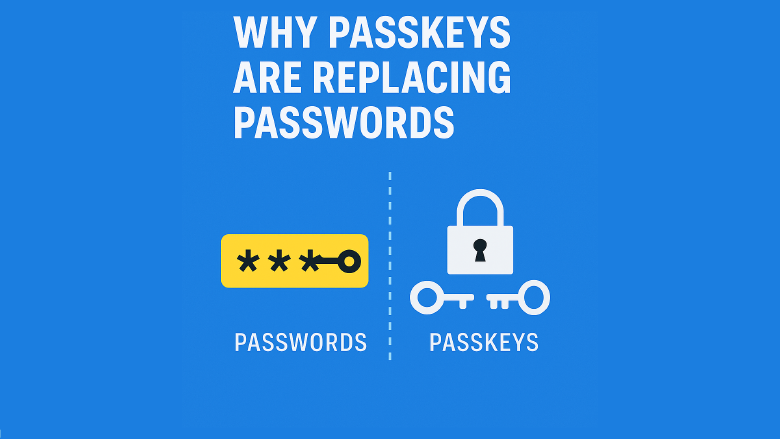Why Passkeys Are Replacing Passwords

Passkeys Are Killing Passwords (And That’s a Good Thing)
Let’s be honest: passwords suck.
They’re either too easy (dogname2023) or too hard to remember. And even strong ones can get stolen or leaked.
That’s why tech giants like Apple, Google, and Microsoft are moving toward a better solution: passkeys.
They’re faster, safer, and way less frustrating. And if you’ve ever used SSH keys to log into a server, the concept will feel surprisingly familiar.
🔑 What’s a Passkey?
A passkey is like a digital lock-and-key system. You don’t type anything in. Instead, your device proves who you are using two cryptographic keys:
- Public key (stored by the website)
- Private key (stored on your device)
When you try to log in, the site sends a challenge to your device. Your device signs that challenge with the private key—and you’re in.
This is similar to SSH keys:
| Feature | Passkeys | SSH Keys |
|---|---|---|
| Public Key | Stored by the website or app | Stored on the remote server |
| Private Key | Stored on your device or password manager | Stored on your local machine |
| Login Flow | Automatic after device unlock | Command-line connection |
| Use Case | Website/app logins | Remote system/server access |
| Protection | Device-based, phishing-resistant | Highly secure, CLI-based |
In both cases, the private key never leaves your device—making it much harder to steal than a regular password.
🛡 Why Are Passkeys More Secure?
- No guessing or reuse — Each passkey is unique to a specific site.
- Phishing-resistant — If you try to log into a fake site, it won’t match your key.
- No server storage — Even if a company’s database is hacked, your key stays safe.
It’s like having a house key that only works in one lock — and only if you’re standing in front of your actual house.
🍪 The Cookie Problem
Even with passkeys, session cookies can be stolen.
- You log in with a passkey.
- Your browser stores a cookie to keep you logged in.
- Malware steals that cookie.
Once a hacker has it, they can impersonate you — no passkey required.
Mitigation tips:
- Set shorter session durations when possible.
- Log out or close your browser after sensitive activity.
- Keep your device malware-free.
📍 Where You Can Use Passkeys Now
Already supported by:
- Google, Apple, and Microsoft accounts
- Amazon, TikTok, and Facebook (partially)
- Password managers like NordPass, Proton Pass, and 1Password
Most iOS and Android devices already store passkeys in iCloud Keychain or Google Password Manager. Many password managers also sync passkeys across devices—though migrating between ecosystems isn’t yet possible (see our passkeys for power users guide).
⚠️ Common Frustrations
1. Confusion with Face ID/2FA
Face ID just unlocks your private key — it’s not the login method itself.
2. Device Lock-In
Lose your phone or password manager? Recovery can be tricky. Always keep a backup device.
3. Patchy Support
Not every site supports passkeys yet — but adoption is accelerating, especially with Microsoft going password-free by default.
✅ Quick Security Tips
- Use passkeys whenever available.
- Store them in a trusted password manager or OS keychain.
- Keep 2FA enabled for password-based accounts.
- Use shorter session cookies where possible.
- Keep devices secure with updates and malware protection.
🗣 Bottom Line
Passkeys won’t fix every security problem, but they solve a lot of the hassle and risk of passwords.
If you know SSH keys, you’ll feel right at home. And if you don’t — you’ll still enjoy faster logins, less phishing risk, and no “forgot password” headaches.
Next time a site offers “Sign in with a passkey,” give it a try. You might never want to go back.
